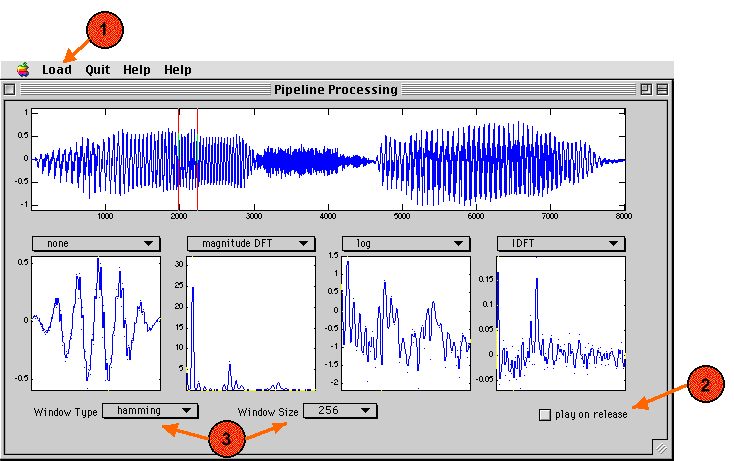 Pipeline Processing
Pipeline Processing Pipeline Processing
Pipeline Processing
Many alternative representations of (speech) signals require a number of basic operations to be performed in sequence. One way of thinking about such sequential processing is as a pipeline. Generally, the start involves the windowing of the signal to select a specific part. Each operation is then performed on the output of the previous point in the pipeline.
This demonstration provides 4 pipeline windows with a choice of 4 possible operations each:
- none
- magnitude discrete fourier transform (DFT)
- inverse DFT (IDFT)
- log
As might be expected, none does not perform an operation on the previous output with one exception: when none is selected in the first pipeline window, the output is in fact the windowed segment selected by the cursors.

Type 'pipeline' to launch the demo. When the window appears, use the load menu (1) to load a sound file. The signal can be played by clicking anywhere within the signal axes. The set of cursors allow the user to estimate their own endpoints. The option of playing the selected portion of the signal on release of the cursors is available (2). Various windowing types and sizes are available (3).
The dropdown menu above each of the pipeline windows is used to select the operation to be performed at that point in the pipeline.
To force one of the pipeline axes to rescale, reselect the existing output from the dropdown menu for that window.
- Use the pipeline to create a cepstral slice. What does the peak in the cepstral slice signify?
What happens to this peak when the cursors are placed over a fricative? How do you explain this?- Use the pipeline to create a power spectrum. What does the fine structure of the output represent?
What does the overall shape represent?- Does altering the window type alter the plots? If so, why?
[1] Parsons, T.W., "Voice and Speech Processing". McGraw-Hill, 1987.
Cepstral Liftering (ceplift) MAD demonstration.
Produced by: Stuart N Wrigley
Release date: Jan 20 1998
Permissions: This demonstration may be used and modified freely by anyone. It may be distributed in unmodified form.